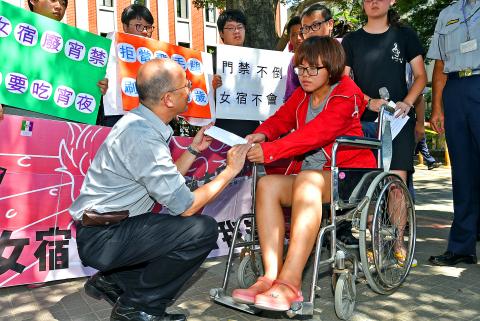University students yesterday called for government intervention to stop Fu Jen Catholic University’s “discriminatory” policy of imposing a curfew on female dormitories.
Students from National Taiwan University (NTU), National Chengchi University (NCCU) and Soochow University staged a rally in front of the Ministry of Education building to voice their support for FJU Cinderella — a group formed by Fu Jen students opposed to the curfew — urging the university to abolish the curfew, which they said was built on a weak premise that violates female students’ freedom.
Fu Jen students said that female students are required to return to the dormitories by midnight, or they will receive a demerit barring them from participating in a draw for dormitory rooms the next semester and be required to perform two hours of chores for every half-hour they are late.

Photo: Chang Chia-ming, Taipei Times
Male students can enter their dormitories whenever they want, they said.
Sitting in a wheelchair, FJU student association chairwoman Liao Yu-wen (廖郁雯), who has been on a hunger strike to protest the curfew since Monday morning, said that a cleric at the school told her that the matter would be discussed at a hearing in October.
She said the university had been holding hearings on the standoff for one year, and that she was disappointed in the school’s perfunctory response.
NCCU Wildfire Front member Lin Tsung-chih (林宗志) said the curfew is undemocratic and outdated, and that Fu Jen should provide better arguments to convince students that a curfew can improve their safety.
He said that gender equality is a universal value that should not be subordinated by the autonomy enjoyed by universities.
He called on all college students to boycott universities that still implement curfews and the ministry to propose bills that would ensure gender equality on campus.
NTU student association head Cheng Ting-yin (鄭婷尹) said that her university in 1993 agreed to the association’s appeal and lifted the curfew on female dormitories.
Thanks to the abolition of curfew, students no longer have to stay out at night for fear of being punished, which greatly improved their safety, she said.
Cheng called on Fu Jen to improve communication with students, saying it was regrettable that its students have to resort to such drastic measures to hold a dialogue with the school administrators on an equal footing.
Independent music promoter and social activist Yao Ken-hsiang (姚茛翔), better known as Indie Dadee (音地大帝), was also on the scene to express solidarity with the students.
“There are many ways to protect students, and the worst thing to do is restrict their freedom, which reveals the school’s oppressive governance style,” Yao said.
Ni Chou-hua (倪周華), a division chief at the ministry’s Department of Higher Education, said the ministry would seek to resolve the standoff by establishing a communication platform between education officials, the university and the students within one month.
He urged students who have joined the hunger strike to take care of their health.
Fu Jen law major Wang Tzu-chi (王子綺) and philosophy major Lin Ya-hui (林雅惠) have also joined Liao in the hunger strike.

Chinese Nationalist Party (KMT) Chairman Eric Chu (朱立倫), spokeswoman Yang Chih-yu (楊智伃) and Legislator Hsieh Lung-chieh (謝龍介) would be summoned by police for questioning for leading an illegal assembly on Thursday evening last week, Minister of the Interior Liu Shyh-fang (劉世芳) said today. The three KMT officials led an assembly outside the Taipei City Prosecutors’ Office, a restricted area where public assembly is not allowed, protesting the questioning of several KMT staff and searches of KMT headquarters and offices in a recall petition forgery case. Chu, Yang and Hsieh are all suspected of contravening the Assembly and Parade Act (集會遊行法) by holding

PRAISE: Japanese visitor Takashi Kubota said the Taiwanese temple architecture images showcased in the AI Art Gallery were the most impressive displays he saw Taiwan does not have an official pavilion at the World Expo in Osaka, Japan, because of its diplomatic predicament, but the government-backed Tech World pavilion is drawing interest with its unique recreations of works by Taiwanese artists. The pavilion features an artificial intelligence (AI)-based art gallery showcasing works of famous Taiwanese artists from the Japanese colonial period using innovative technologies. Among its main simulated displays are Eastern gouache paintings by Chen Chin (陳進), Lin Yu-shan (林玉山) and Kuo Hsueh-hu (郭雪湖), who were the three young Taiwanese painters selected for the East Asian Painting exhibition in 1927. Gouache is a water-based

Taiwan would welcome the return of Honduras as a diplomatic ally if its next president decides to make such a move, Minister of Foreign Affairs Lin Chia-lung (林佳龍) said yesterday. “Of course, we would welcome Honduras if they want to restore diplomatic ties with Taiwan after their elections,” Lin said at a meeting of the legislature’s Foreign Affairs and National Defense Committee, when asked to comment on statements made by two of the three Honduran presidential candidates during the presidential campaign in the Central American country. Taiwan is paying close attention to the region as a whole in the wake of a

OFF-TARGET: More than 30,000 participants were expected to take part in the Games next month, but only 6,550 foreign and 19,400 Taiwanese athletes have registered Taipei city councilors yesterday blasted the organizers of next month’s World Masters Games over sudden timetable and venue changes, which they said have caused thousands of participants to back out of the international sporting event, among other organizational issues. They also cited visa delays and political interference by China as reasons many foreign athletes are requesting refunds for the event, to be held from May 17 to 30. Jointly organized by the Taipei and New Taipei City governments, the games have been rocked by numerous controversies since preparations began in 2020. Taipei City Councilor Lin Yen-feng (林延鳳) said yesterday that new measures by